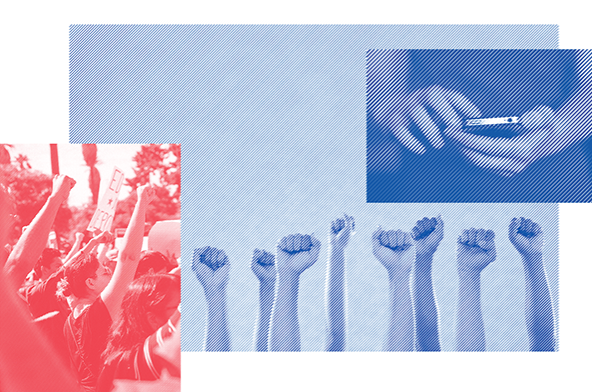Listen, Learn, Lead: Your Rights as a Student Advocate for Social Justice

Student advocacy takes on many forms in the 21st century. From classroom discussion to digital expression, students must know their rights.
October 23, 2020
In the landmark Supreme Court Case Tinker v. Des Moines (1969), the courts ruled that neither students nor teachers “shed their constitutional rights to freedom of speech or expression at the schoolhouse gate.” This inalienable right to free speech has not changed. However, freedom of expression is slightly more nuanced. The political and social environment has changed since the sixties. As students openly express their views through protests, social media, and classroom discussions; it is important to understand students’ rights. A great resource to start is the American Civil Liberties Union or the ACLU, a non-profit with the mission of protecting and upholding constitutional rights.
The ACLU outlines six basic rights that are guaranteed to every student at school. All students’ have the right to free speech as protected by The First Amendment. This constitutional right extends to students’ freedom of expression. Regardless, there is zero-tolerance for hate speech or any act that threatens the integrity of the school. When a student expresses themselves online or through social media, they enter a gray area in terms of legal protections. However, the same rule applies; never say, write, or post anything that would cause harm or disclose personal information about another person.
Additionally, students’ have the right to express themselves through what they wear; but schools also are allowed to establish dress codes. Schools often take precautions when creating dress code policies. Dress codes should never be discriminatory nor should they target certain individuals. While Adams does not require students to wear a uniform, it is still mandatory that students abide by the school’s standard of dress.
Adams prides itself on being a welcoming, safe environment for all students. The belief that students learn best when alongside classmates from different backgrounds is at the forefront of the school’s ethos. The unique experiences and backgrounds of each student foster a sense of community in our school. Therefore, “Schools cannot discriminate against students on the basis of race, color, or natural origin.” Additionally, “Undocumented children cannot be denied their right to a free education.” Immigrant rights extend to students’ English proficiency as well, which requires schools to provide students with language instruction.
Adams is an equal opportunity institution. As a public high school, federal laws protect students with disabilities; ensuring these students have equal access to courses, extracurriculars, technology, and student health services. Educators must accommodate students’ needs whether that is making their classroom more accessible, or defending students from bullying. All students should extend kindness to each other, and it goes without saying that, ‘if you see something, say something.’
LGBTQ students have a right to be who they are and express themselves at school. This includes being addressed by their preferred pronouns and having access to appropriate locker and bathroom facilities. Going to school should never make students feel subconscious about who they are, but all too often schools fail to address incidents of bullying or bias. Bullying can be pervasive towards students who identify openly as LGBTQ, as fellow students and teachers, we have the responsibility to help everyone feel welcome at school.
Lastly, according to Title IX federal law, schools cannot discriminate against pregnant students or students with children. According to the ACLU, “Public schools must ensure that pregnant students have access to the same accommodations that students with temporary medical conditions are given, including the ability to make up missed classwork and learn in a safe, nonjudgmental environment.”
As a student, it is important to understand your rights. Whether you are speaking out against social injustice, standing up against bullying, or making a social media post, reflect on your rights as a student. Understanding your rights helps to ensure you know how to respond if you ever feel your rights are violated.


